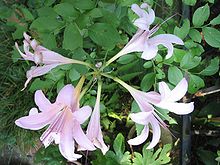
Amaryllis is the only genus in the subtribe Amaryllidinae. It is a small genus of flowering bulbs, with two species. The better known of the two, Amaryllis belladonna, is a native of the Western Cape region of South Africa, particularly the rocky southwest area between the Olifants River Valley and Knysna.

Leucojum is a small genus of bulbous plants native to Eurasia belonging to the amaryllis family, subfamily Amaryllidoideae. As currently circumscribed, the genus includes only two known species, most former species having been moved into the genus Acis. Both genera are known as snowflakes.
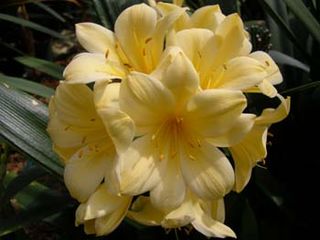
Clivia is a genus of monocot flowering plants native to southern Africa. They are from the family Amaryllidaceae, subfamily Amaryllidoideae. Common names are Natal lily or bush lily.
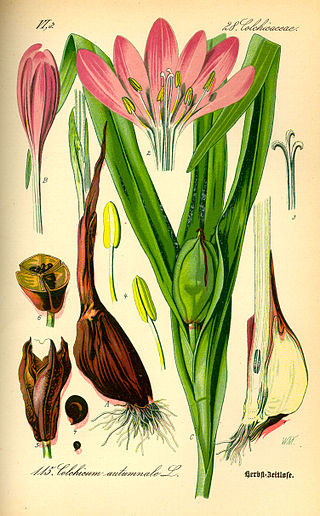
Colchicum autumnale, commonly known as autumn crocus, meadow saffron, naked boys or naked ladies, is a toxic autumn-blooming flowering plant that resembles the true crocuses, but is a member of the plant family Colchicaceae, unlike the true crocuses, which belong to the family Iridaceae. It is called "naked boys/ladies" because the flowers emerge from the ground long before the leaves appear. Despite the vernacular name of "meadow saffron", this plant is not the source of saffron, which is obtained from the saffron crocus, Crocus sativus – and that plant, too, is sometimes called "autumn crocus".

Arum maculatum, commonly known as cuckoopint, jack-in-the-pulpit and other names, is a woodland flowering plant species in the family Araceae. It is native across most of Europe, as well as Eastern Turkey and the Caucasus.

Amaryllis belladonna, the Jersey lily, belladonna-lily, naked-lady-lily, or March lily, is a plant species native to Cape Province in South Africa but widely cultivated as an ornamental. It is reportedly naturalized in many places: Corsica, Portugal, the Azores, Madeira, the Canary Islands, the Scilly Isles of Great Britain, the Democratic Republic of the Congo, Ascension Island, Australia, New Zealand, Mexico, Cuba, Haiti, the Dominican Republic, Chile, California, Texas, Louisiana, Mississippi, Michigan and the Juan Fernández Islands.

Nerine is a genus of flowering plants belonging to the family Amaryllidaceae, subfamily Amaryllidoideae. They are bulbous perennials, some evergreen, associated with rocky and arid habitats. They bear spherical umbels of lily-like flowers in shades from white through pink to crimson. In the case of deciduous species, the flowers may appear on naked stems before the leaves develop. Native to South Africa, there are about 20–30 species in the genus. Though described as lilies, they are not significantly related to the true lilies (Liliaceae), but more closely resemble their relatives, Amaryllis and Lycoris. The genus was established by the Revd. William Herbert in 1820.
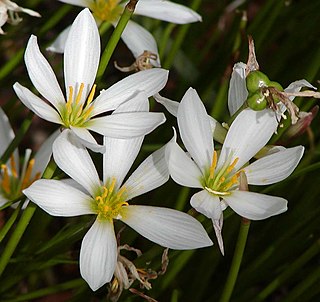
Zephyranthes is a genus of temperate and tropical bulbous plants in the Amaryllis family, subfamily Amaryllidoideae, native to the Americas and widely cultivated as ornamentals. Following the expansion of the genus in 2019, which now includes the genera Habranthus and Sprekelia, there are about 200 recognized species, as well as numerous hybrids and cultivars. Common names for species in this genus include fairy lily, rainflower, zephyr lily, magic lily, Atamasco lily, and rain lily.

Lycoris is a genus of 13–20 species of flowering plants in the family Amaryllidaceae, subfamily Amaryllidoideae. They are native to eastern and southern Asia in China, Japan, southern Korea, northern Vietnam, northern Laos, northern Thailand, northern Burma, Nepal, northern Pakistan, Afghanistan, and eastern Iran. They were imported into North Carolina and now grow wild. In English they are also called hurricane lilies or cluster amaryllis. The genus shares the English name spider lily with two other related genera.
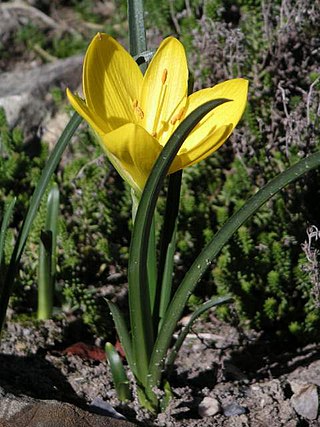
Sternbergia lutea, the winter daffodil, autumn daffodil, fall daffodil, lily-of-the-field, or yellow autumn crocus, is a bulbous flowering plant in the family Amaryllidaceae, subfamily Amaryllidoideae, in the Narcisseae tribe, which is used as an ornamental plant. It has yellow flowers which appear in autumn.
Resurrection lily may refer to:
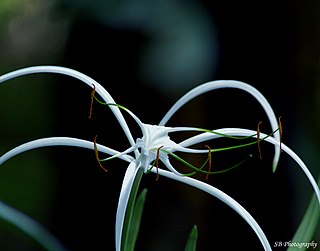
Spider lily is the common name for a number of different plant species within the subfamily Amaryllidoideae which belong to the following genera:
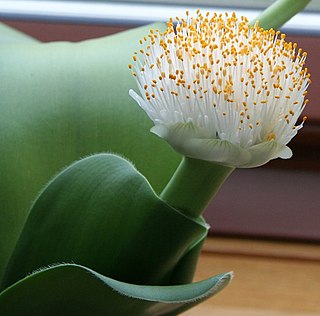
Haemanthus is a Southern African genus of flowering plants in the family Amaryllidaceae, subfamily Amaryllidoideae. Members of the genus are known as blood lily and paintbrush lily. There are some 22 known species, native to South Africa, Botswana, Namibia, Lesotho and Eswatini. About 15 species occur in the winter rainfall region of Namaqualand and the Western Cape, the remainder being found in the summer rainfall region, with one species Haemanthus albiflos occurring in both regions.

Erythronium revolutum is a species of flowering plant in the family Liliaceae which is known by several common names, including mahogany fawn lily, coast fawn lily, and pink fawn lily. It is native to the west coast of North America.

Lycoris radiata, known as the red spider lily, red magic lily, corpse flower, or equinox flower, is a plant in the amaryllis family, Amaryllidaceae, subfamily Amaryllidoideae. It is originally from China, Japan, Korea and Nepal and spread from there to the United States and elsewhere. It is considered naturalized in Seychelles and in the Ryukyu Islands. It flowers in the late summer or autumn, often in response to heavy rainfall. The common name hurricane lily refers to this characteristic, as do other common names, such as resurrection lily; these may be used for the genus as a whole.

Calostemma is a small genus of herbaceous, perennial and bulbous plants in the Amaryllis family, commonly known as Wilcannia Lily. It consists of three species endemic to Australia, where they are distributed in arid regions with summer precipitation.
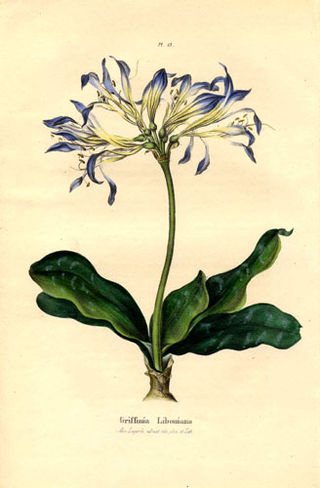
The Griffineae is a tribe in the family Amaryllidaceae, subfamily Amaryllidoideae. It includes 3 genera with 22 species endemic to Brazil in South America. A typical character of the representatives of the tribe are the flowers - They are blue or lilac and collected into an umbel. Only the members of this tribe and the genus Lycoris are able to form flowers with such color in the whole subfamily Amaryllidoideae of Amaryllidaceae. The species in this group are typically perennial and produce bulbs. The leaves are green, with elliptical form in most of the cases but in some members, as in Worsleya, they are sword-shaped.
Naked lady or naked ladies may refer to several plants:

Flower Crew: Joseon Marriage Agency is a 2019 South Korean television series starring Kim Min-jae, Gong Seung-yeon, Seo Ji-hoon, Park Ji-hoon, Byeon Woo-seok, and Go Won-hee. It is based on the 2014 novel of the same name by Kim Yi-rang who also wrote the series. It aired on JTBC's Mondays and Tuesdays at 21:30 (KST) from September 16 to November 5, 2019.
